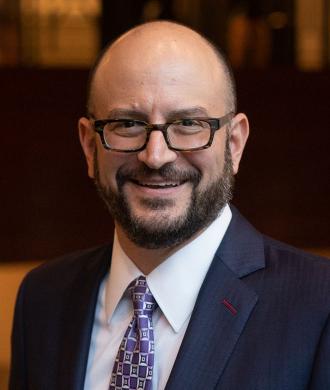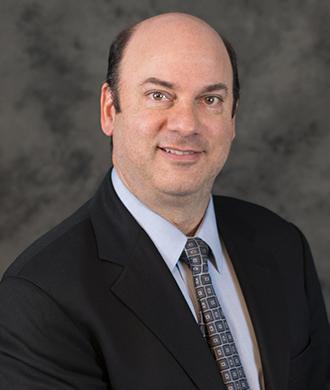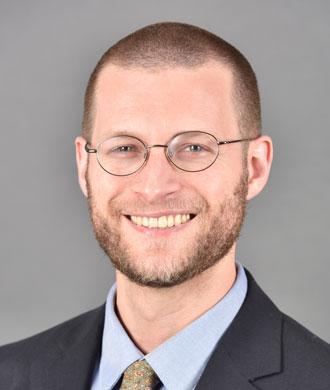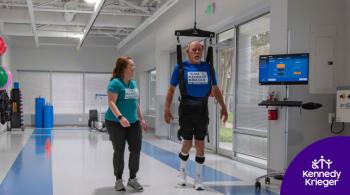Developmental and Pediatric Neuropsychiatry: What is it and the Implications on the Brain
Join Dr. Brad Schlaggar President and CEO of Kennedy Krieger Institute and three colleagues: Dr. Jay Salpekar, a pediatric neuropsychiatrist, Dr. Roma Vasa, a child and adolescent psychiatrist and Dr. Aaron Hauptman, pediatric and adult neuropsychiatrist we discuss the specialty area of neuropsychiatry, in particular, developmental and pediatric neuropsychiatry.
Learn More About Our Featured Speakers
Learn More About Our Featured Speakers
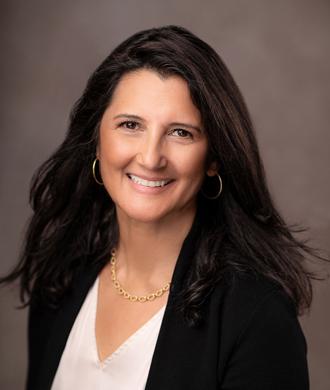
Roma
Vasa
,
MD
View Episode Transcription
Dr. Bradley Schlaggar (BS): Welcome to Your Child's Brain, a podcast series produced by Kennedy Krieger Institute with assistance from WYPR. I'm Dr. Brad Schlaggar, pediatric neurologist, president and CEO of Kennedy Krieger Institute. Neurology and Psychiatry. These are two highly related fields of medicine. Our topic today is the specialty area of neuropsychiatry, in particular, developmental and pediatric neuropsychiatry. In many respects, neuropsychiatry sits at the intersection of neurology and psychiatry. The word neurology means the study of the nervous system, so a neurologist takes care of patients with disorders of the nervous system. That's the brain, brain stem, spinal cord, nerve, and muscle. The word psychiatry literally means to heal the mind. A psychiatrist provides diagnosis and treatment for disorders of mental health. Neurologists and psychiatrists have much in common. They are physicians who take care of patients with disorders of the brain. Why are there two branches of medicine caring for the brain? The answer is complex, but it comes from a long-held belief system that the mind and brain are somehow separate. They're not. Indeed, what we colloquially think of as the mind is in fact the result of brain function. How we each experience the world around us, and the world within each of us is via our brains. This framing of the brain's role is beyond a philosophical or academic argument because it has implications for mechanisms and treatments of disorders of brain functions, which include movement, cognition, language, emotion or effect, and behavior. Importantly, classic neurological disorders like epilepsy and stroke, and dementia are highly likely to be accompanied by classic psychiatric disorders like ADHD, depression, and anxiety. Neurodevelopmental disorders like Down Syndrome, cerebral palsy, and autism are also highly likely to be accompanied by what are broadly considered to be classic psychiatric issues. Today I'm joined by three of my colleagues at Kennedy Krieger Institute who are true experts in this space. Dr. Jay Salpekar, a pediatric neuropsychiatrist, directs the Neuropsychiatry Center at Kennedy Krieger Institute. He's also an associate professor of Psychiatry and Behavioral Sciences and of Neurology at the Johns Hopkins University School of Medicine. Dr. Roma Vasa is a child and adolescent psychiatrist and is the director of Psychiatric Services at the Center for Autism and Related Disorders at Kennedy Krieger, where she also built and now directs the Developmental Neuropsychiatry Scholars Program, training the next generation of pediatric-focused neuropsychiatrists. Dr. Vasa is a professor in the Department of Psychiatry and Behavioral Sciences at Johns Hopkins University School of Medicine. Dr. Aaron Hauptman is a pediatric and adult neuropsychiatrist and is the associate director of the Neuropsychiatry Center at Kennedy Krieger Institute. Dr. Hauptman is an assistant professor of Psychiatry and Behavioral Sciences at Johns Hopkins as well. Welcome Jay, Roma, and Aaron. Roma, let's start with you. What do we mean when we talk about pediatric or developmental neuropsychiatry? When did this field emerge and what were the reasons for the origins of the field? Maybe also comment on how Kennedy Krieger and Johns Hopkins were instrumental in the origins of this field.
Dr. Roma Vasa (RV): Well first, these are interchangeable terms. They referred to a specialized field within child psychiatry that focuses on providing psychiatric care to children who've had some form of disruption to brain development just like you said. This could be disruption at any time in development when children are really young, during childhood years, or adolescent years. This field is pretty broad. It includes children who have neurodevelopmental disorders such as autism and intellectual disability, as well as those who have a wide range of neurological conditions such as epilepsy and cerebral palsy. Now, we have known for many years that children with developmental neuropsychiatric conditions require specialized psychiatric care, so providers who are taking care of these children they have to have unique and specialized training in the field. But it really hasn't been until the past 50 years that this field has been recognized as a new discipline. One of the most influential leaders in the field has been Dr. James Harris, who founded the field of developmental neuropsychiatry. Jim was a child psychiatrist and just a wonderful person who worked both at Kennedy Krieger and Johns Hopkins. He was a fierce advocate for providing the best possible care for children with developmental and neuropsychiatric disorders. He built programs and clinics and mentored so many of us, like myself, to care for these groups of children. We owe it to him and others for bringing this really exciting field to the forefront. Since Jim's passing, we have all continued here at Kennedy Krieger and really across the nation and the world to build a vision for developmental neuropsychiatry.
BS: Dr. Jay Salpekar, moving to you. What kind of childhood diseases or disorders do neuropsychiatrists focus on? We heard a bit of that from Roma, but could you expand on that?
Dr. Jay Salpekar (JS): Essentially we're going to see anyone with a neurologic disease that is complicated. There's a lot of complicated conditions like epilepsy is probably a good place to start where there are ripple effects. There are things that happen with the brain and behavior and mood, concentration that are part of these neurologic diseases. That's the kind of thing that we'll see. When I first came to Kennedy Krieger, we focused primarily on epilepsy. Epilepsy was so common and so complicated for many kids even for a fairly straightforward to manage epilepsy because the concentration problems or the mood problems that accompany the seizure disorder were difficult to sort out. We started just with epilepsy alone, and in the past number of years we've expanded to other conditions. Maybe head injuries, concussions, developmental conditions like autism, or other genetic conditions also. Then we've branched out to think about complex neuroinflammatory conditions. People talk a lot about PANDAS or PANS. We'll see some of those folks, and then we'll see other people with complex disorders of metabolism. It can get very complicated, but where we started with epilepsy, we expanded throughout the brain in different conditions of development, anybody that has a ripple effect that needs sorting out.
BS: Aaron, neuropsychiatry sounds a lot like the word neuropsychology. Can you explain how these two areas differ? Do we have both at Kennedy Krieger? If so, how do they interface with each other, and do some patients need support from one or the other, or both?
Dr. Aaron Hauptman (AH): Neuropsychology is a subfield within psychology that focuses on cognitive testing, which I'll say a little bit more about in a second. Whereas neuropsychiatry is a medical subfield. Even though they sound quite similar, the providers who are offering these services are going to come from very different backgrounds through a psychology training route versus through a medical training route. The goals of neuropsychological testing are to be able to better understand the cognitive strengths and weaknesses of an individual. What are cognitive domains like language, or visuospatial function, or memory? Different disorders of the brain affect these in different proportions. Neuropsychological testing can be very helpful for things like educational planning, especially if someone has a complex brain disorder, or even for things as complicated as trying to better understand which parts of the brain are being affected by some injury to the brain that's resulting in epilepsy in part of planning for epilepsy surgery. They can be used in very day-to-day educational functions or these really more rarified, very medically specific cases. Neuropsychiatry, as we've talked about a little bit, is really focused on trying to diagnose and treat cognitive emotional behavioral symptoms related to underlying neurological conditions or injuries. At Kennedy Krieger, we offer both. I would say it's fairly common that a lot of the patients who are being seen in neuropsychiatry are people who would benefit from neuropsychological testing. It is a nuanced and extremely detailed field that can really help guide so many of the decisions that we make. We are in constant communication between neuropsychiatry and neuropsychology when we have shared patients. Because what we uncover and diagnose and plan to treat in one of our fields can really impact what's going on in the other. We often will get referrals, sometimes we'll get mistaken referrals, which always makes us feel so terrible because people wait so long for testing and then they accidentally are referred to us or vice versa so I really am glad to get to clarify.
BS: Well, you did that well. Let's stick with you, Aaron. Let's talk about some specific examples of neuropsychiatric diagnoses. A relatively recent discovery is the anti-NMDA receptor antibody encephalitis diagnosis. I distinctly remember when that first paper on the topic was published in 2007. It was a revelation because it explained a population of patients that we had all been seeing for years. While we had theories, we really didn't have a clear idea of what was happening and then that all changed. Can you tell us about that diagnosis and its broader impact on neuropsychiatry and neurology and psychiatry per se?
AH: The discovery of anti-NMDA receptor encephalitis really changed the field as you described. This allowed clinicians to diagnose a population who I think before then were very confusing because these are often patients who present, sometimes with exclusively psychiatric symptoms, but usually with a very complicated combination of psychiatric and neurological symptoms, and often become extremely sick. This allowed for diagnosis and treatment of this population and really the identification of who is appropriate for these kinds of immunotherapies. Since 2007, the field has grown exponentially. There are now dozens of related or similar antibodies that are searched for as part of the workup for patients with usually acute onset, really abrupt presentations of psychiatric and neurological symptoms. It is a field that's growing really by the day. Each time we order these panels, these specific panels of antibodies, they change, they grow, they develop, and they shift from year to year. It's really something that we pay a lot of attention to because the things that we're diagnosing change from month to month. We're at a funny intermediate place, I think, in terms of our understanding of these diagnoses. Because something that we've been seeing in addition to the ability to diagnose this subset of patients, is that often we are trying to explain everything by autoimmune conditions and antibodies, and because we don't fully understand this field yet and it really is under development, we sometimes will have patients who really do have a primary psychiatric diagnosis, but we're searching for an antibody as something to identify, as a really specific cause and we just don't know enough yet. The confusion goes in both directions and so while it's been incredibly helpful, it also sometimes sends us on these very detailed trips down the rabbit hole and we don't end up with answers.
BS: It really did change the way we think about diagnosis and treatment. Very specific targeted kinds of diagnostic workup, but also medications that influence or modulate the immune system to treat a problem that looks like a neurologic and or psychiatric presentation clinically was a significant game changer for the field and as you say, it's really rapidly evolving in the times since that initial discovery just 15, 16 years ago. Jay, let's talk about the mechanisms that bring patients and families to see a neuropsychiatrist. How do they find you?
JS: Well, Brad, I think I'm going to capitalize on what Aaron was just talking about in terms of confusion. Anybody who's confused is going to find us. They're going to look for some comprehensive approach and somebody that can connect the dots between neurology and psychiatry and what's happening in the brain and then what we see. Now in terms of practically, we have a Neuropsychiatry Center where people can contact us at Kennedy Krieger. We have a terrific set of administrators and clinicians that can match people up to different clinicians that we have in the center. We do a very good job of that. We're happy for people to come in. But I think people are going to search for us if they're confused. If they are not getting a full treatment approach from one particular clinician or one particular department and then they're going to find us and we're going to try to connect the dots and put everything together.
BS: Roma, let's turn to children with autism. As I mentioned earlier, you direct psychiatric services at Kennedy Krieger Center for Autism and Related Disorders. In autism, there's a concern about the high rates of psychiatric disorders and issues and more recently, the high rates of suicidal ideations or thoughts and behaviors in this group. How do you frame those sets of issues in the context of autism and to what extent do factors like development and the diagnosis of autism itself, what effect do those play in your consideration?
RV: We've known for a long time that autistic children and adults have very high rates of psychiatric and behavior disorders. The research shows that about 70% of kids with autism have at least one psychiatric or behavioral disorder. By the time kids come to see a child psychiatrist like us at the autism center, many have at least three or more psychiatric behavioral disorders. The challenge here is that when you have a psychiatric disorder that overlays on top of the autism, it can further decrease quality of life. It gets in the way of school functioning, home, recreational activities. Therapists are calling us and saying, we can't work with this child effectively in therapy because their anxiety, their ADHD, their behavior is getting in the way. The types of psychiatric and behavioral conditions that manifest in autistic individuals are broad, they're complicated, they're comorbid, meaning often it's never one alone. A child can have ADHD, anxiety, depression, obsessive-compulsive disorder, self-injury. When they get older, there's a greater risk for bipolar disorder, psychosis, and eating disorders. There's quite a wide range in the way psychiatric and behavioral conditions can manifest. Usually the risks are genetic, life stressors. But also sometimes the autism symptoms themselves can pose increased risks and symptoms like rigidity and difficulty shifting one's thoughts can increase risk for anxiety and depression. Like you mentioned, there's really grave concern about the high rates of suicidal thoughts and behaviors. We know that the risk of suicidal thoughts and behaviors is about five times higher in autistic individuals and that on average, autistic individuals, and this refers to older adolescents and young adults, make their first suicide attempt about three and a half years earlier than those who don't have autism. This is really serious. People around the world are very concerned about this and we have a lot of work to do to develop better diagnostic tools and treatments, so we can detect these psychiatric and behavioral conditions earlier. I think the most important thing parents can do is to notice when their child is exhibiting a change, some change in their emotional or behavioral functioning, in their ability to perform daily life skills, in their functioning at school. When they see that change, I think it's critical that they talk with their child's physician and likely seek mental health care before things become more severe.
BS: Roma, what is the role of medications in treating primary psychiatric and behavioral conditions in children with neurodevelopmental issues like autism and intellectual disability?
RV: We have some evidence that medications can treat some psychiatric conditions with autism. But there's a lot more research that we need to do on studying the effects of medicine. We know there's two medicines that are approved by the Food and Drug Administration, Risperidone and Aripiprazole, and these are specifically indicated for irritability, aggression, and self-injury. They can also help stabilize mood and they can treat other conditions such as ticks and psychosis and so forth. We know some medications can treat ADHD, such as stimulants, and other medicines such as guanfacine and clonidine. But there's less actual research evidence for the effectiveness of other medications in autism like anxiety medications, depression medications. But just because we have less research, just because they're not improved by the FDA, it doesn't mean we don't try them. Because when we see a child who's struggling with a psychiatric condition and that's affecting their functioning, we need to come in with approaches to help them and we have evidence in children who don't have autism that some of these medicines can work. I think there's a few things to remember about medications. The first is they should always be prescribed as part of a multidisciplinary treatment plan. If a child has ADHD, sure they can take stimulant medications such as Methylphenidate or Ritalin. But they should also be seeing a behavioral specialist and receiving support at school and parents should be working on a structured environment at home. Medications we know just work better when all these other components of treatment are in place. The second is that medicines need to be selected and prescribed carefully. We like to start with milder and gentler medicines and then move to stronger medicines. And if needed, only stronger medicines, when other milder medicines and non-medication approaches have been first tried. We always start at low doses, we increase very gradually, we know that kids with autism are really vulnerable and sensitive to side effects. One thing I always say to parents is follow up with your mental health provider very regularly. We want to make sure the medications are doing their job, and we want to make sure your child is not having side effects.
BS: Jay, going back to your point earlier that you and Aaron made about confusion, one of the ideas is that there can be masquerading that neuropsychiatric diseases can masquerade as a primary psychiatric disorder or vice versa. How do you disambiguate whether one is masquerading for the other?
JS: That's the challenge. It can be very difficult to sort these things out. Masquerade is a good way to describe it too, because it can fool clinicians and certainly when you think you're seeing one thing as a parent or a caregiver or as a clinician, but it's actually coming from somewhere else, then you can slow down and get delayed in terms of your treatment approach and treatment plan. One good example that we see all the time is a child with absence seizures. Now, absence seizures are typically called petit mal. It usually happens in school age children where they're just staring, and it gets the name because if a teacher is calling role in a classroom and a child doesn't answer because they're having a petit mal seizure, then they'll be logged as absent. The nomenclature has gone to absence seizures. Well, it turns out that even though these absence seizures might only last for five or 10 seconds, so many of these kids have cognitive problems or difficulties in school with attention and concentration, and they tend to do very poorly in school. Well, if a seizure episode is only five or 10 seconds, but a child does poorly in school throughout the day, how do we match that up? Well, the answer is because absence seizures are a lot more complicated than just a 5-10 second episode that happens maybe a few times during the day. What happens in the brain? The build up and the recovery time can be hours long. A child may not be quite up to par or up to speed in terms of keeping up with the classroom work and attention span the tasks through the day. Just because of having these 5-10 second episodes that have ripple effects. That's a good example. There are many other examples of people who seem anxious or nervous, but they're actually having a seizure, or they're having some processing issues that make it hard to orient themselves or interact with the environment, communicate, speak, listen, or be attentive to what's going on around them. Then we can talk more and more about different symptoms that reflect something underlying in the brain or different mood states that can reflect something underlying. There are a lot of different examples, epilepsy is just one of them, but there are many different conditions like that too.
BS: Jay, sticking with you, this neuropsychiatric way of thinking about disorders of the brain. How do you think it influences the way you approach considerations for treatment and the kinds of treatments that are or may be available?
JS: We have many options for treatment. There are so many different medicines now. There have been an explosion of antiseizure medicines and antipsychotic medicines. We're getting better at using things like antidepressants and stimulants too. I think that the main question that people come in with, and I'm talking about epilepsy a lot. But people will ask a question and a parent or caregiver will say, I can't tell if it's the seizures or if it's the behavior or if my kid is just being a kid. Those are the things that we have to sort out. I think a lot in terms of time course of seizure activity. When does that happen? What brings it on? How long does it last? What's the recovery period? I think a lot about where the seizures are coming from. If they're coming from a part of the brain that leads to anxiety or that we know has a lot to do with depression or anxiety, the mesial temporal lobe is a good example, and that's the middle part of the temporal lobe with structures like the amygdala, hippocampus. Well, then I may not be too surprised to see some mood symptom or depression, or anxiety. Now sometimes we can use an antiseizure medicine that will work for both seizures and for mood. We have some pretty good evidence, we've done research at Kennedy Krieger to find out which medicines will work best for that type of thing if we're trying to treat both conditions with one medicine. We have a pretty good head start just in terms of our experience and knowing what to do. That's just one example. There are a lot of different other medicines that we can use to treat both conditions. As long as we think about the time course and what we're seeing, where in the brain these things are happening, sometimes we can match them up.
BS: Aaron, does having a neuropsychiatric diagnosis have implications for the ability to recover from an illness? Are there differences compared to primary psychiatric disorders in terms of outcome and recoverability?
AH: It's hard to answer that question simply because the span of conditions that we think of as neuropsychiatric conditions is so wide. But I would say in general, yes, there are a lot of implications for comparing diagnosis through neuropsychiatric lens. Thinking about two particular circumstances that we tend to see could be helpful. One is we may see patients where they have a kind of atypical presentation for a psychiatric diagnosis. This triggers us to do more elaborate medical and neurological workup. There are many cases where that could then help us find something identifiable, the treatment of which could have significant implications for outcomes, could give us very targeted treatment options and could really help us use the psychiatric symptoms almost as an identifier of the underlying neurological condition. In many others, we have somebody who has an identified neurological disorder, say something like epilepsy or cerebral palsy, or a wide range of other conditions. Thinking through the neurological lens, it gives us a much more integrated sense of how to approach managing some of the psychiatric behavioral, emotional, and cognitive commodity. We may not be able to treat the underlying condition. I think cerebral palsy is a really helpful example. People who have cerebral palsy, which we used to really think of as primarily a motor disorder. They can often experience psychiatric comorbidities which can be debilitating for them as much or more than the underlying motor symptoms. While we might not be able to treat the underlying injury to the brain that results in their cerebral palsy, we can treat the depression, anxiety, some of the cognitive symptoms which are the most problematic.
BS: Roma, let's just talk for a bit about how we broadly have approached the increasing demand for specialists who have expertise in neuropsychiatric care, especially for children and adolescents, both historically and presently.
RV: We have known for the past 50 years that we need to improve access to care for kids with developmental neuropsychiatric disorders. This is very critical, especially as we're hearing that the prevalence of autism continues to rise. Most child psychiatrists receive little training in this field during their residencies. The goal has been, in terms of the field of child psychiatry, is to improve training for child psychiatrists. But we know child psychiatrists alone can't address the workforce needs. We're also training pediatricians and nurse practitioners so that we can build capacity across specialties. In addition, if you're a child psychiatrist and in your residency you did not receive training in developmental neuropsychiatry, there are about a dozen programs around the country that are offering these new innovative one year advanced specialty training programs in the field. What we're saying is, look, if you haven't had this training before, think about doing an extra one year to develop the unique skill set to treat children with developmental neuropsychiatric conditions. Aaron, Jay, and myself have started this program at Kennedy Krieger, the one year advanced training program. It's called the Developmental Neuropsychiatry Scholars Program. We're really excited about the program. We've had two graduates already who we can confidently say have had developed outstanding clinical skills to work in this space. We know they're going to become leaders in the field and help us train more experts. We are starting the third year of this program. It's efforts like these, developing new ways to give people the skills that they need so that they can go out and open doors for children with developmental neuropsychiatric conditions and increase access and provide best practice clinical care.
BS: Going to close with this question for you Jay. What's on the horizon in the field of neuropsychiatry in terms of research that will have implications for improving patient outcomes?
JS: It's a very exciting time. There are a lot of new developments happening. We're understanding much more about how the brain works and why it does what it does, and why we see what we see. We're getting much better at treatment. We're understanding that we can actually use medicines that can treat two simultaneous conditions, mood states, seizure disorders. We're also understanding more about the throughput of information processing in the brain. And when those things go awry because of an inflammatory condition or an injury, or a developmental condition, we're getting much better at describing what we see and thinking a little bit differently in terms of how it works in pathophysiology and how we can treat it. A lot of treatment aspects, a lot of clinical trials, a lot of understanding and thinking a lot more, listening to people, listening to parents, listening to children and adolescents tell us what's going on and how we can sort it out.
BS: Well, I want to thank each of our guests. We hope that you, our listeners, have found our discussion informative and helpful. Please check out our entire library of topics on Your Child's Brain at Wypr.org, KennedyKrieger.org, wypr.org/studios, or wherever you get your podcasts. You've been listening to Your Child's Brain. Your Child's Brain is produced by Kennedy Krieger Institute with assistance from WYPR and producer Spencer Bryant. Please join us next time as we examine the mysteries of your child's brain.

